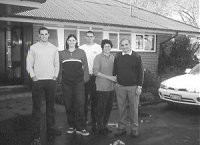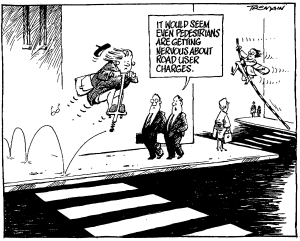In Christchurch, around 20 per cent of residential rates is used to maintain and develop local roads. However, ratepayers should not expect a 20 per cent saving as the Council would still have responsibility for a number of activities associated with roads, including maintenance of features such as footpaths, grass berm areas, malls and other amenities. A 15 per cent residential rates decrease would be more likely if the Government goes ahead with its proposals. Coupled with a 16 per cent increase in South Island petrol prices, some Christchurch people would be better off, while others would be worse off. Those who rent and those who use a lot of petrol would be worse off. Those in high value properties and those who do not travel great distances on the roads may be slightly better off.
|
 |
Joan and Laurie live in St Albans. Their home has a government valuation of $140,000, which means they pay $14.09 each week in City Council rates. They own and drive a 1988 Ford Laser which covers around 10,000 km each year. Under the reforms their weekly rates bill would drop to $11.98, but their weekly spend on petrol would increase by $2.27. Overall, they would be 16 cents worse off each week. |
 |
Claudio and Patricia live in their own $400,000 Bryndwr home, paying $37.08 each week in City Council rates. With children David, Anna and Mark the family runs five cars: a 1987 Barina which covers around 20,000 km each year, a 1984 Bluebird which also covers 20,000 km, a 1992 Galante which travels around 30,000 km, a 1991 Hilux which travels around 12,000 km and a 1981 Mitsubishi Sapporo which covers around 25,000 km. Under the reforms their weekly rates bill would drop to $31.52, but their weekly spend on petrol would increase by $24.31. Overall, they would be $18.75 worse off each week. |
 |
Bruce and Sue own a $145,000 home in Somerfield where they live with children Georgina and Sean, paying $14.52 each week in City Council rates. They own a 1989 Lancer which travels around 18,000 km each year and a 1982 Honda City which covers around 12,000 km. Under the reforms their weekly rates bill would drop to $12.34, but their weekly spend on petrol would increase by $6.25. Overall, they would be $4.07 worse off each week. |
 |
Margaret and Mike rent a $140,000 house in Bromley where they live with daughters Sinead, Chelsea and Courtney. On a property of this value, their landlord pays $14.09 each week in City Council rates. The family owns a 1985 Toyota Town Ace in which they travel around 15,000 km each year. Under the reforms their landlord would pay $2.11 less in rates each week, which may or may not be passed on to Margaret and Mike. They would have to spend $4.15 more on petrol each week. Overall, they would be worse off. If their landlord passed the rates reduction on by reducing their rent they would be only $2.04 worse off, but if their landlord did not pass on the reduction, they would be $4.15 worse off each week. |
|

